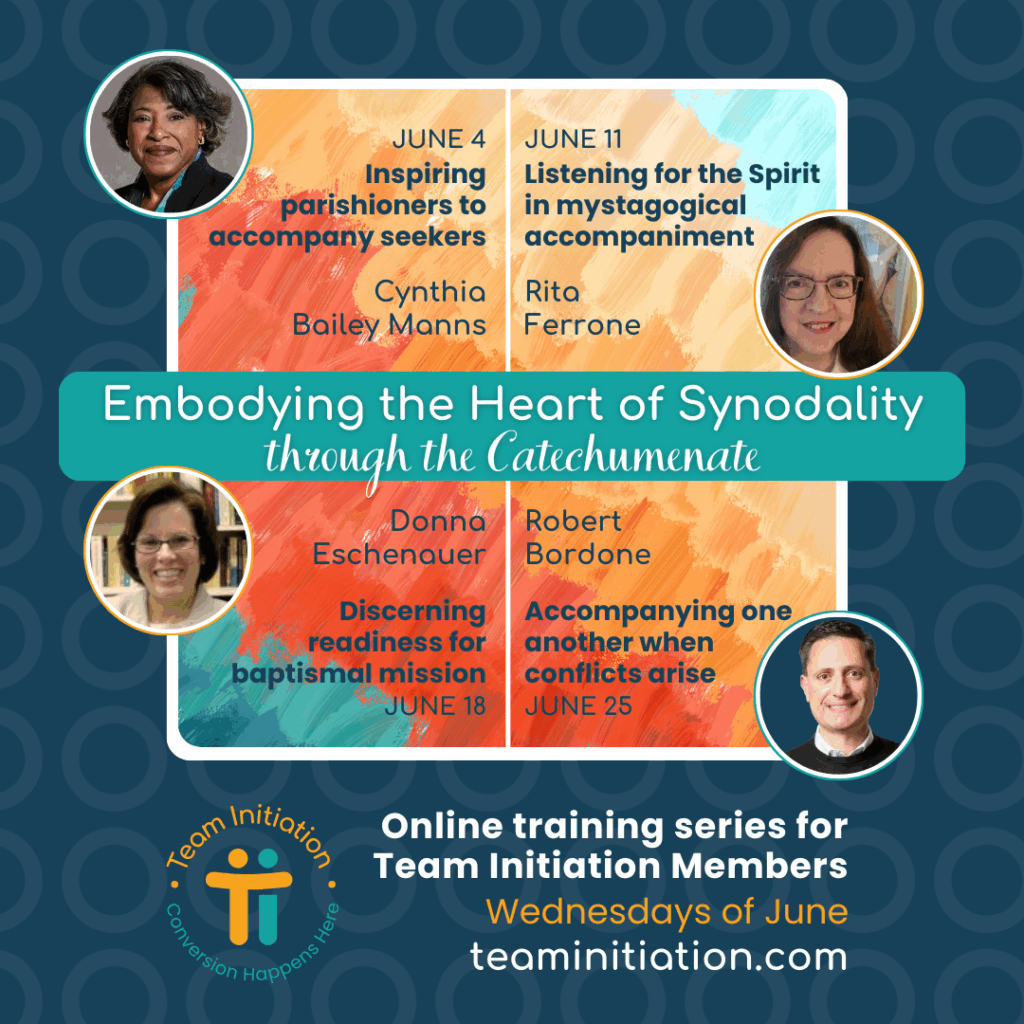In several recent articles, we’ve explored how synodality—a way of walking together—is foundational to the catechumenate. In this article, I want to highlight a key component of both synodality and the catechumenate: listening for God’s Spirit.
Listening is the heart of synodality and the catechumenate
Pope Francis has consistently emphasized the importance of listening. He wrote:
Communicating means sharing, and sharing demands listening and acceptance. Listening is much more than simply hearing. Hearing is about receiving information, while listening is about communication, and calls for closeness. Listening allows us to get things right, and not simply to be passive onlookers, users or consumers. Listening also means being able to share questions and doubts, to journey side by side, to banish all claims to absolute power and to put our abilities and gifts at the service of the common good. (World Communications Day, 2016)
Mystagogical reflection begins by honoring the seeker’s lived experience
When we apply this teaching to the process of mystagogical reflection, we realize that we must first listen deeply to the lived experience of a seeker’s encounter with Christ. This might feel counterintuitive—shouldn’t we start by telling them about Christ? But the Holy Spirit doesn’t work that way. The Spirit moves within real lives, real stories.
Recall the story of the disciples on the road to Emmaus. Jesus didn’t begin by teaching. He asked questions. He listened to the disciples’ grief and confusion. Only then did he open the Scriptures and reveal himself. This is the model for mystagogical accompaniment. We respectfully enter into each seeker’s journey as if walking on sacred ground, guided by the Spirit.
A mystagogue listens with reverence, patience, and care. We are not the experts with all the answers. Rather, we are fellow pilgrims, helping seekers name and claim the grace God has already poured out upon them. To do this, we have to accept and believe that the Holy Spirit is already active in the seeker before they ever meet us.
This style of accompaniment reflects the vision of synodality as described in the final Synod document: “a path of spiritual renewal and structural reform that enables the Church to be more participatory and missionary.” That’s precisely what we’re doing in mystagogical reflection—helping seekers interpret their encounter with Christ so they can participate fully in the life and mission of the Church.
The Vademecum for the Synod on Synodality describes the synodal process as beginning with “deep and respectful listening to one another.” This same posture marks the entire catechumenate journey—from initial inquiry through mystagogy. As seekers become active participants in discerning God’s presence, they are prepared for lifelong discipleship.
What we’re doing in mystagogical reflection is helping seekers interpret their encounter with Christ so they can participate fully in the life and mission of the Church.
Listening leads to discernment and readiness for mission
Ultimately, mystagogical accompaniment is about mission. By walking with seekers and listening attentively, we help them recognize how Christ is sending them out into the world. The Order of Christian Initiation of Adults reminds us that part of our job is to discern the seekers readiness for mission (see OCIA 43). Through mystagogical reflection, we help seekers identify how the Holy Spirit is guiding them and cooperate more closely with the urgings of the Spirit.
As catechumenate ministers, we are called to be what Pope Francis describes as “accompanists who remove their sandals before the sacred ground of the other” (Joy of the Gospel, 169). This requires humility, discernment, and an openness to the Spirit—not just in the seeker, but in ourselves.
And here is the gift: when we prepare seekers for mission, the parish itself becomes more missionary. Listening to those in our midst forms us to better listen to those still outside our doors. In this way, mystagogical accompaniment doesn’t just form the seekers to be evangelists—it makes all of us better evangelizers. When we practice patient, Spirit-led listening, we don’t just serve the seekers. We become a community capable of reflecting Christ’s own posture: walking alongside, asking questions, and revealing good news through loving presence.
What has been your experience?
I’d love to hear what you think. How do you practice deep listening in your ministry? Have you seen mystagogical accompaniment help form your parish into a more missionary community? Share your thoughts, stories, or questions in the comments below—your experience can inspire and guide others on the journey.
Coming This June: A Journey of Accompaniment and Mission!

Team Initiation Members—don’t miss our upcoming exclusive four-part online speaker series:
Embodying the Heart of Synodality through the Catechumenate
Join us as we explore what it means to walk with seekers and parishioners in a spirit of accompaniment.
📅 Mark your calendars:
Four Wednesdays in June 2025
11:00am Pacific / 2:00pm Eastern
(June 4, 11, 18, and 25)
👉 This series is available only to Team Initiation Members.
Not a member yet? Click here to join today.















